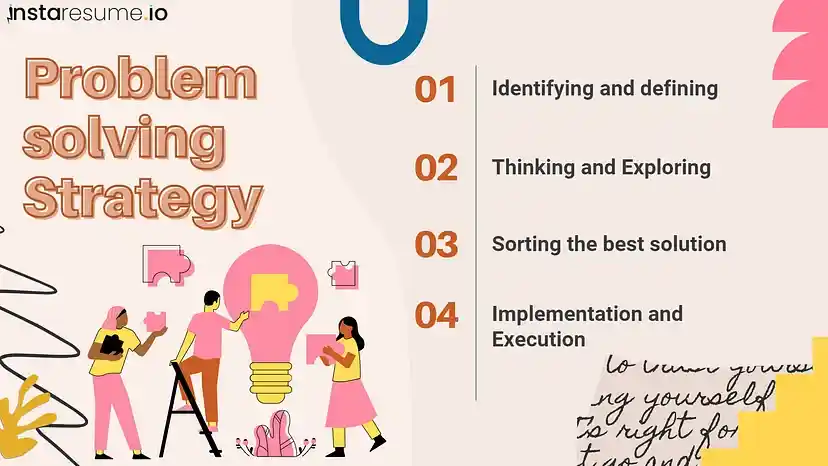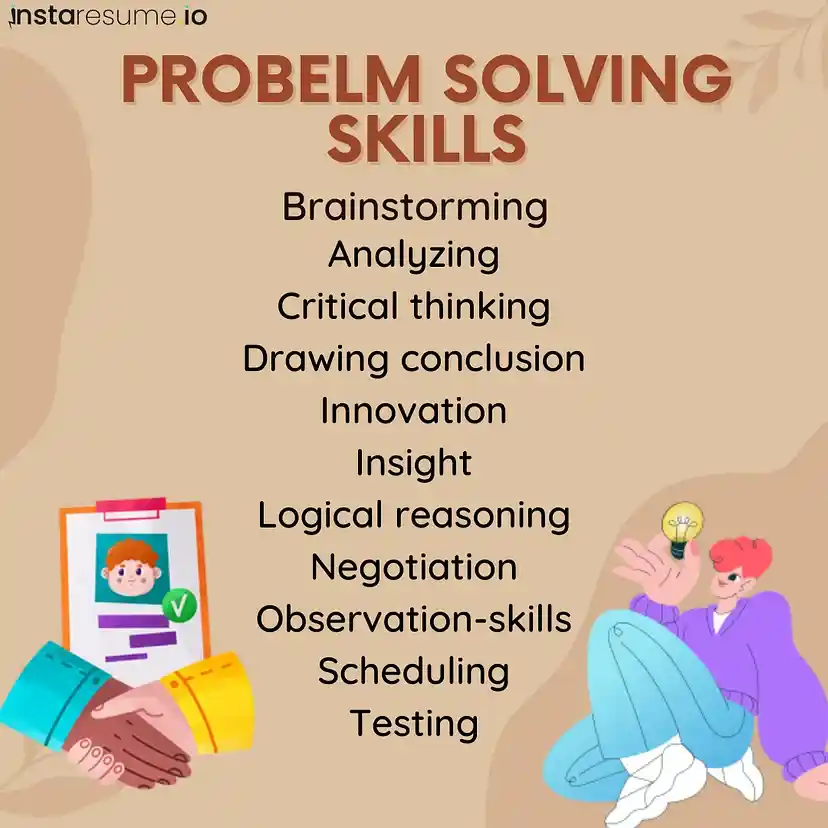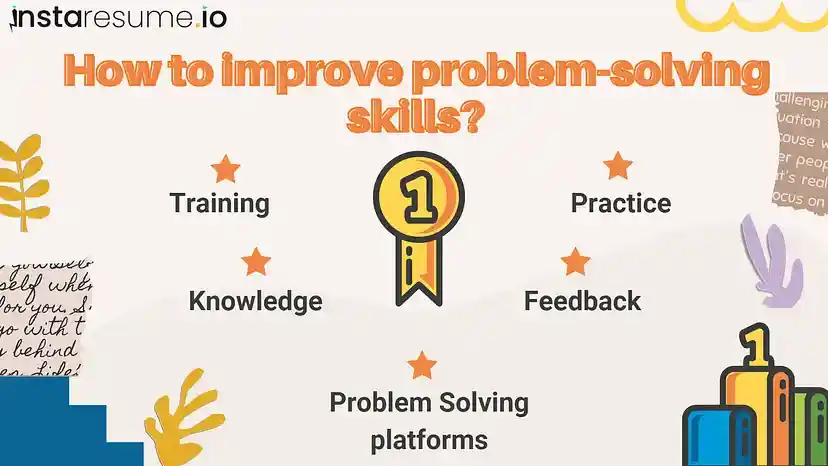Approaches to Problem Solving & Problem Solving in Psychology

Photo by Olav Ahrens Røtne on Unsplash
Solving problems is essential to our day-to-day lives. The ability to solve problems is a fundamental skill It’s a process. Problem-solving skills aren’t just for your workplace. Starting your day by deciding what to wear is also a skill. Identifying a problem, developing all the possible solutions, and selecting an appropriate answer is process of solving problems.
In this article, we will discuss what are the basic Approaches to problem solving, whats the importance of problem solving skills, how to mention them in your resume, steps to improve your problem solving skills and finally what is problem solving in psychology
There are 4 basic Approaches to problem solving:
These basic problem solving strategies can improve your problem-solving ability.

Approaches to problem solving
- Identifying and then defining: The first step would always be identifying and then defining the problem. This involves observation, careful inspection, and finding facts.
- Thinking and exploring: The second step would be thinking and exploring all the possible solutions. This involves brainstorming. Brainstorming is the spontaneous contribution of creative ideas and solutions.
- Sorting the best solution: The third step would be sorting the best solution. This involves decision-making and strengthens your ability to make correct decisions.
- Implementation and execution: The last step would be the implementation and execution of the solution. So basically this means to start a course of action and perform or accomplish the solution.
Importance of Problem-Solving skills
Problem-solving skills are greatly valued by recruiters. In today’s fast-evolving technology and market conditions, recruiters often seek everyday problem-solving as crucial to the success of their company or organization. Excellent problem-solving skills qualify you not only in your personal life but are essential in your professional life.
What Recruiters seek in their potential employees is the ability to handle difficult or unexpected situations in the workplace as well as complex business challenges. Experts suggest 86% of employers look for problem-solving skills on student resumes.
Here are some problem solving skills examples for student's listed below:

Sample problem-solving skills people should always strive for
How to mention problem-solving skills in your resume?
You must highlight your problem-solving skills on your resume. You can further explain how your problem-solving skills helped in getting a specific task done at your previous workplace. You can highlight your problem-solving skills in several locations as shown in the example:
Problem Solving skills examples in resume:
Professional Summary
You can highlight your analytical skills in your professional summary effectively. For example: Excellent problem-solving and communication skills.
Sample Professional Summary:
Proficient software engineer passionate about developing user-friendly software applications. Outstanding problem-solving skills. Seeking to help Company and develop its product as a software engineer. Skilled with C, C++, Java, JavaScript, and Python. Implementation of strategies to meet the company’s organizational needs.
Skills Section
You must mention problem-solving skills under soft skills in the skills section.
Sample Skills Section:
Ultimate time-management to deliver items having tight schedule
Good written Communication while expressing my ideas to the team
Always open to learn new things in life.
Work History Section
You highlight your problem-solving skills in the Work experience section. This is the proving part. Here you prove your problem-solving skills with the help of your accomplishments. For example, Enhanced team productivity by implementing time-tracking software.
Sample Work Experience:
EXPERIENCE of UX Designer
Used tons of similar project-management apps on a daily basis to identify potential gaps and issues that would affect the customer experience while using the app.
Used data to identify how my team can make better decisions and improve UX experience of apps.
Initiated ‘weekly brain-stroming sessions’ for design related improvements, So that everyone is on same page for design related aspects.
Overcome challenges connected to client complaints and working with a limited client budget.
Education Section (Achievements)-
Here is an example of how to include problem-solving skills under the education section on your resume:
Sample Education:
Participated in Global issues problem-solving test.
Developed an AP Calculus curriculum that resulted in a 4.35 average on AP testing.
How to improve your Problem-Solving skills?

How to improve problem-solving skills
- Certifications and Training: Look out for courses and technical platforms that can help you with your problem-solving abilities. Apart from training and certifications, you can participate in events and workshops to improve your problem-solving ability. You may grab every opportunity to volunteer for new projects in your current role, on another team, or outside the workplace for another organization. Many platforms provide you with services to improve or polish your problem-solving skills like Udemy, Coursera, Youtube, Google, Microsoft, Edx, etc.
- Gain more knowledge: Knowledge enhances cognitive processes like problem-solving and reasoning. If you have strong working technical knowledge you can achieve all your desired goals. Knowledge comes into play mainly because we want to learn how to think critically. The more you know, the easier it will be for you to learn new things. Knowledge enhances thinking in two ways. First, it helps you solve problems by freeing up space in your working memory. Second, it improves reasoning and critical thinking.
- Practice: Practice makes a man perfect. Problem-solving skills are all about practice. The more you practice the more efficient you will be. You can find practice books for your industry and problem-solving scenarios online. Skills can be refined with practice. Practice helps you with focusing better on your problem solving skills; it enables you to understand your field better and gives you time to reflect upon your shortcomings to improve them with time.
- Feedback: Feedback is the most important aspect that can help you identify your errors. It improves your confidence and motivation to learn. You can approach your seniors or mentors and ask for feedback. Whether the feedback is positive or negative, always take it positively and work on your weaknesses. Take the time every day to reflect on the progress you’re making.
- Problem-solving Platforms: Do you know that there is n number of problem-solving platforms out there? Online interactive platforms have proved to be today’s ever-growing technologies of the best privileges. If you are a programmer, then problem-solving is something you should do for yourself and you need to know how to improve problem solving skills in programming. Here is the list of some problem-solving platforms:
Unlocking the Power of Problem Solving in Psychology:
Have you ever felt stuck in a problem that seems impossible to solve? Do you find yourself repeatedly trying the same ineffective solutions, only to end up with the same unsatisfactory results? These common struggles can be frustrating, but they are also an opportunity for growth and development. In psychology, problem-solving is a crucial skill that can be applied to a wide range of challenges. In this section, we will explore the power of problem-solving in psychology, and provide 5 most common problem solving strategies in psychology for effective and sustainable change.
- Understanding the problem: The first step in effective problem-solving is to clearly define and understand the problem. This involves gathering information, identifying any underlying factors that contribute to the problem, and determining the scope and magnitude of the issue.
- Generating solutions: Once the problem is defined, the next step is to generate potential solutions. This can involve brainstorming, using heuristics, or drawing on past experiences. It is important to consider a range of solutions and to evaluate their feasibility and potential effectiveness.
- Evaluating solutions: After potential solutions are generated, it is important to evaluate them based on their feasibility, effectiveness, and potential risks and benefits. This can involve testing solutions on a small scale or using simulation tools.
- Implementing the solution: Once the most effective solution is identified, it is time to implement it. This can involve developing an action plan, communicating with stakeholders, and monitoring progress.
- Maintaining change: To ensure sustainable change, it is important to monitor the effectiveness of the solution over time and make any necessary adjustments. This can involve collecting data, soliciting feedback, and using ongoing evaluation strategies.
Conclusion
So, now we have enough idea on approaches to inculcate problem-solving skills and importance of having problem-solving skills. At the end, everyone wants a job they can be proud of. For that, We now have examples on how can we mention problem-solving skills efficiently in our resume. For creating the kick-ass resume where your skillset will be highlighted efficiently using ultimate templates please head on to instaresume.io and open horizon for your new job.

